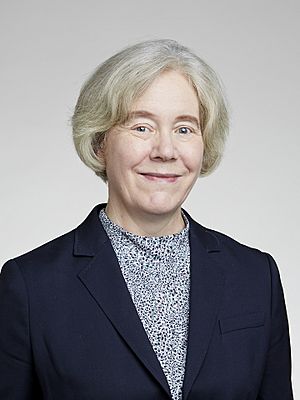Ellen D. Williams (scientist) facts for kids
Quick facts for kids
Ellen D. Williams
|
|
|---|---|

Williams in 2016
|
|
| Born | December 5, 1953 Oshkosh, Wisconsin, U.S.
|
| Alma mater |
|
| Awards |
|
| Scientific career | |
| Institutions | |
| Thesis | Studies of chemical adsorption using low energy electron diffraction (1982) |
| Doctoral advisor | William Henry Weinberg |
Ellen D. Williams (born December 5, 1953) is an American scientist. She is well-known for her important work with very tiny materials, called nanotechnology. She also helped the U.S. government with science advice for national security. Dr. Williams was also the chief scientist for a large energy company, BP, and led a government agency called ARPA-E.
Contents
Early Life and Education
Ellen D. Williams was born in Oshkosh, Wisconsin, in 1953. She grew up in the suburbs of Detroit, Michigan. She went to Michigan State University and earned her first degree in chemistry in 1976. Later, she got her PhD in chemistry from the California Institute of Technology in 1981. Her research there was about how chemicals stick to surfaces.
Career Highlights
After her PhD, Dr. Williams did more research at the University of Maryland. She became a professor there in 1991. She studied how solid surfaces are shaped and how they change. She also started and led a research group focused on materials science from 1991 to 2009. In 2000, she became a "distinguished university professor." This is a special title for top professors.
In 2010, Dr. Williams took a break from the university. She became the chief scientist at BP, a big energy company. She worked there until 2014.
Later, President Barack Obama asked her to lead ARPA-E. This is a government agency that funds new energy technologies. She was confirmed for this role in December 2014. She led ARPA-E until January 2017. After that, she returned to her professor job at the University of Maryland. In 2020, she became the director of the Earth System Science Interdisciplinary Center at the University of Maryland.
Academic Research
Dr. Williams's research focuses on the science of surfaces. She studies how atoms and molecules behave on surfaces. This helps us understand how to make new materials, especially for nanotechnology. Her team used special tools to take pictures of tiny structures on surfaces. This helped them understand how materials work at a very small scale. Her work has helped scientists learn more about things like catalysis (speeding up chemical reactions) and how thin films grow. She has written over 200 scientific articles.
Advising the U.S. Government
Besides her university work, Dr. Williams has given a lot of scientific advice to the U.S. government. She worked with the Departments of Energy and Defense. For example, she led a study about how to check for nuclear testing. This report helped decision-makers understand how well we can detect such activities. She is also the vice-chair of JASON. This is a group of independent scientists who advise the U.S. government on important science and technology issues.
Work at BP
As chief scientist at BP, Dr. Williams helped guide their technology programs. She also worked on strategic research. She encouraged BP to use advanced computer methods in chemistry and data analysis. She also led a research program about how natural resources affect energy. This program created booklets about energy resources like water and biomass. Dr. Williams has often talked about the need for new science and technology to provide the energy the world needs in a sustainable way.
Work at the Department of Energy
Before leading ARPA-E, Dr. Williams advised the Secretary of Energy. She helped create a new office to help move new technologies from government research labs into the economy.
At ARPA-E, Dr. Williams worked to make the agency more efficient. She helped teams get their new energy technologies ready for the market. She also started a series of reports to show the impact of ARPA-E's projects. These reports explain the challenges, achievements, and how these new technologies can help solve energy problems.
Awards and Honors
Dr. Williams has received many awards for her scientific work. In 2016, she was elected a Foreign Member of the Royal Society of London. This is a very high honor for scientists. Other awards include:
- Fellow of the American Association for the Advancement of Science, 2019
- Honorary Member of Sigma Pi Sigma (physics honors society), 2019
- Distinguished Alumnus Award, California Institute of Technology, 2016
- Honorary Ph.D., Michigan State University, 2016
- Member of the National Academy of Sciences, 2005
- Materials Research Society – David Turnbull Award, 2003
- Fellow of the American Academy of Arts and Sciences, 2003
- American Physical Society – David Adler Lectureship Award in the Field of Materials Physics, 2001
- Japan Society for the Promotion of Science Fellow, 1996
- Fellow of the American Vacuum Society, 1993
- Fellow of the American Physical Society, 1992
- American Physical Society Maria Goeppert Mayer Award, 1990
- Office of Naval Research Young Investigator, 1986-1989
- Presidential Young Investigator Award of the National Science Foundation, 1984-1989

